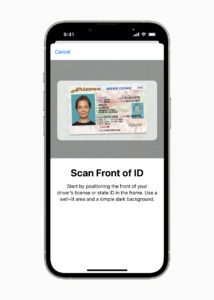
Apple’s mobile ID has finally, officially launched, making Arizona ground zero for what is poised to become a sprawling digital ID program.
First announced in June of 2021, Apple’s mobile ID system is designed to let iPhone users add virtual versions of the driver’s licenses and state ID cards to the mobile device’s Wallet app. Further details trickled out over the ensuing months, as the initial launch date of the mobile ID system was postponed from late 2021 to early 2022.
Now it’s here, and Arizonans can not only add their government-issued IDs to the Wallet, but can already present them as official ID at TSA security checkpoints in the Phoenix Sky Harbor International Airport.
A Smartwatch Surprise
The news also brings a development that was not widely anticipated: mobile ID functionality via the Apple Watch. While an iPhone must be used in the initial onboarding process to get a user’s digital ID set up, a paired Apple Watch can subsequently be used for identity verification at the airport. The smartwatch or iPhone needs only to be tapped at a security checkpoint identity reader device in order to confirm the user’s identity, prompting a biometric authentication request via Touch ID or Face ID, Apple’s fingerprint and face scanning systems.
The process does not require the user to actually present their virtual credentials to a TSA agent, or even to unlock their device – a remarkable feat of user experience engineering, given stringent airport security practices.
Apple’s success in obtaining the TSA’s cooperation on this aspect of the mobile ID can surely be attributed, at least in part, to the system’s rigorous onboarding process. The end user is asked to upload a selfie along with images of their official identity document, and facial recognition is used to match them. But it also goes a step further, prompting the user “to complete a series of facial and head movements”, as Apple explained in its announcement. This appears to be a kind of active, gesture-based liveness detection mechanism.
The mobile ID solution offers a number of data privacy advantages to end users. Only the information needed in a given interaction with state authorities will be shared in a given interaction, based on what the user’s authorizes; and, as mentioned above, encrypted communications with the identity reader mean that the user doesn’t need to show an actual credential to an agent. A lost iPhone or Apple Watch containing a digital ID can be remotely locked and even erased.
Beyond Sky Harbor
As for interactions with authorities beyond the airport, such as state police, it isn’t yet clear whether Apple’s mobile ID will be accepted as official identification. Apple’s announcement focused solely on airport applications.
“We’re thrilled to bring the first driver’s license and state ID in Wallet to Arizona today, and provide Arizonans with an easy, secure, and private way to present their ID when traveling, through just a tap of their iPhone or Apple Watch,” said Apple Pay and Apple Wallet VP Jennifer Bailey. “We look forward to working with many more states and the TSA to bring IDs in Wallet to users across the US.”
On that note, Apple’s announcement brought new revelations about which states it was working with to deliver further launches of its mobile ID system. In addition to the handful of state partnerships that were previously announced, the company noted that rollouts in Colorado, Hawaii, Mississippi, Ohio, and Puerto Rico are coming “soon.”
This week also brought a report that Apple representative had met with the New York DMV Deputy Commissioner in the latter half of 2021 to discuss the mobile ID program.

Follow Us